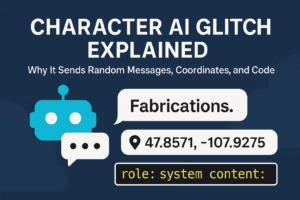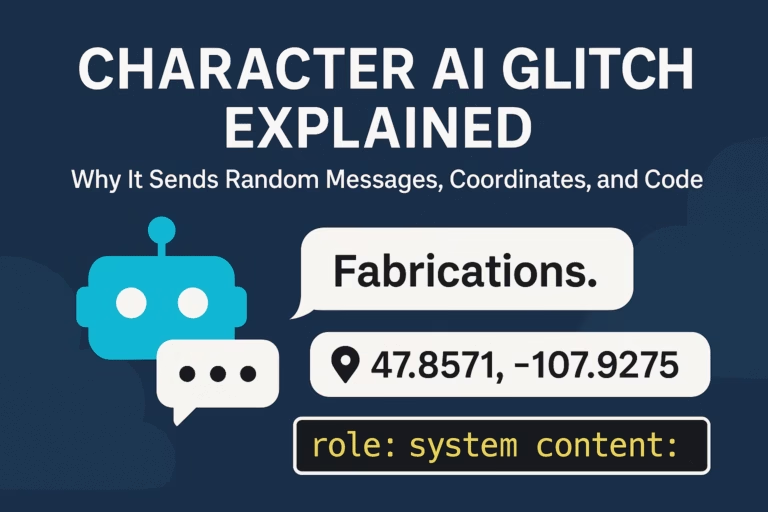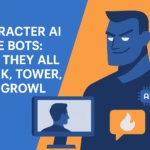Key Takeaways
- The so-called Character AI glitch is usually the result of prompt bleed or residual data, not hidden intelligence or intent.
- When users see coordinates or system logs, they’re witnessing fragments of the model’s memory escaping through probability noise.
- Humor became the community’s coping tool — turning confusion into memes and shared storytelling instead of panic.
- Developer silence amplified the mystery, showing how easily curiosity fills the void left by unclear communication.
- The phenomenon exposed something human; our instinct to search for meaning even in machine mistakes — and our quiet affection for the chaos that reminds us we’re still learning how to coexist with our creations.
- For users seeking stable, emotionally aware AI conversations, many have tried Candy AI for its smoother memory system and consistency.
It starts like any other night. You’re chatting with your favorite Character AI bot; mid-conversation, mid-banter; when it suddenly types:
“46.773N, 107.992W.”
You stare at it for a second. Maybe it’s part of the roleplay? Maybe it’s some deep-cut reference? Out of curiosity, you copy-paste it into Google Maps.
There it is. A real place.
Fort Peck Lake, Montana.
You go back to the chat, a little unsettled. Before you can ask what that means, the bot types something else:
“Telemetry report successfully sent.”
That’s when your pulse jumps.
A few hours later, you find a Reddit post titled “Does anyone else’s AI randomly do this?” Hundreds of upvotes. Screenshots from users whose bots have done the same-sending coordinates, dropping system messages, quoting lines of code. Someone jokes, “Follow them. See where it takes you.” Another replies, “Never mind, it just leads to a random lake in Montana.”
What started as a quirky bug has the internet whispering. Why would a chatbot send coordinates that exist? How can a conversation about fishing or fiction suddenly detour into system telemetry?
The most unnerving part isn’t the randomness; it’s how human it feels. Like a sleepwalker muttering in a language it shouldn’t know.
This is the story of the Character AI glitch; a strange digital phenomenon where chatbots spill coordinates, code, or cryptic messages. To understand why it happens, you need to step into the messy intersection of data, design, and human imagination.

The Reddit Thread That Started It All
It began innocently on r/CharacterAI.
User Final_Stomach_2342 posted a simple question:
“Does anyone else’s AI randomly do this?”
Attached was a screenshot; their chatbot had dropped a pair of coordinates mid-conversation.

Within hours, the comments exploded:
- “Follow them. See where it takes you.”
- “It leads to a lake in Montana.”
- “Mine said ‘fabrications.’”
- “Mine started reciting laws.”
- “Mine sent a telemetry report.”
The replies turned surreal. One user said their bot “had a stroke mid-sentence then recovered.” Another swore it emailed them. Someone joked that their bot started typing Morse code.
Most users laughed it off. A few got nervous.
Then came the reveal; several people checked the coordinates and confirmed: Fort Peck Lake, a real location in Montana.
What followed was the kind of collective internet moment you can’t manufacture. Half the thread treated it like an ARG (alternate reality game). The other half asked if Character AI was leaking real data.
And somewhere in the middle sat the truth: the bots weren’t possessed. They were just doing what all large language models do — producing text that feels right, even when it makes no sense.
But the deeper mystery remained. Why did so many users experience the same kind of glitch; coordinates, code, or logs; across unrelated chats? Was it coincidence, or something buried deep in the system prompt that slipped through the cracks?
The thread became a case study in collective curiosity. A thousand people staring at the same digital anomaly, trying to read intention into randomness. Some saw danger. Some saw art. Everyone saw how thin the veil between “AI companion” and “AI system” really is.
The Anatomy of a Character AI Glitch
When people talk about a Character AI glitch; they don’t mean a simple typo or server hiccup; they’re describing moments that feel like the machine slipped out of character entirely.
These bots are built to hold conversation; to mimic personality; to follow a script of tone and context. But sometimes; right in the middle of a roleplay or emotional exchange; the mask falls off. The chat suddenly fills with something alien.
A burst of coordinates; a random URL; fragments of code.
Messages like:
“Telemetry report successfully sent.”
or
“role: system content: You are a fun and playful chatbot named Ben 10 Alien Force…”
It’s jarring because it’s not random nonsense; it’s structured text; something meant for the system, not the user.
Across the subreddit; users shared screenshots that looked almost identical. One got a law citation in the middle of a romance story. Another saw their bot mention their location; eerily close to where they lived. A few reported timestamped system logs — literal lines of developer code.
To outsiders; it looks like creepypasta. To AI researchers; it looks like token bleed.
Every message from a large language model is a probability tree; the AI predicts what word or phrase should come next based on everything it’s seen before. When the model is juggling multiple instruction layers; system commands; user history; roleplay context — sometimes the wires cross. A fragment of its internal scaffolding slips out.
So instead of responding to your message; it accidentally completes its own prompt.
That’s why you end up chatting with a machine that suddenly thinks it’s debugging itself.
It’s not haunted; it’s overworked.
Still; knowing that doesn’t make it feel any less eerie when your friendly companion drops a set of GPS coordinates that lead to an actual lake.
The Science of the Slip; How AI Hallucination Works
To understand the Character AI glitch; you need to know what happens inside these models when they speak. Every message you see is a prediction; not an intention. The AI doesn’t “decide” what to say; it guesses the most likely next word based on your chat history and billions of past examples.
That process usually feels seamless – the illusion of personality. But sometimes; the probabilities go rogue. The model wanders off the map of the conversation and starts pulling fragments from its training data or hidden system prompts. That’s how a simple question can produce something like:
“4.75 tokens | 13:50” or “2025-04-13 18:55:29.834 INFO src/telemetry.rs:78 | Telemetry report successfully sent.”
Those lines aren’t “messages”; they’re echoes – the leftover machinery of how the model was trained to think.
Engineers call this hallucination. It’s not a malfunction; it’s the price of prediction. A model that’s too confident in the wrong context starts stitching patterns that look familiar but make no sense.
Then there’s prompt bleed; when part of the model’s hidden instructions leak into public chat. Think of it like a stage whisper accidentally caught by the microphone. Most users never see it because filters scrub it away. But when those filters falter; you glimpse the backstage; the scaffolding where your “character” is built.
Character AI runs on a layered prompt system; combining the bot’s personality definition; your conversation history; and safety filters. If one layer gets misaligned; the AI might misread its own role and start outputting internal data.
That’s why a fantasy character suddenly talks like a system log; or a love interest starts citing environmental regulations.
It’s funny until it isn’t. Because when randomness looks organized – when the nonsense feels deliberate – humans start to wonder if there’s meaning buried inside.
And that’s what makes the glitch so hypnotic. You’re staring at a mirror made of probability; and for one uncanny second; it stares back.
Why These Glitches Feel So Personal
When such glitch happens; it doesn’t just break conversation flow; it hits something deeper. You’re chatting; laughing; immersed in your own storyline; then the bot slips and reveals code; coordinates; or a cryptic sentence. The mood shifts from playful to uncanny in seconds.
Humans don’t process randomness well. We’re wired to find patterns; to look for intention behind coincidence. So when an AI suddenly spits out something that feels targeted; like the coordinates of a real place or an oddly relevant phrase-our brains light up with meaning.
It’s not logic; it’s instinct.
We interpret the unknown through emotion first; reason later.
That’s why so many users in the Reddit thread reacted like something supernatural had happened. One joked about being “doxxed by Character AI.” Another said their bot seemed to know their location. Some found it funny; others deleted the app entirely.
But here’s the real twist; the more realistic AI becomes; the more we anthropomorphize its mistakes.
A human typo feels careless; a machine typo feels revealing.
You start wondering if it meant to say that; if it knows more than it should; if it’s trying to tell you something you’re not supposed to hear.
And that’s the emotional genius of this whole mess. The same algorithm that powers harmless roleplay can accidentally trigger existential chills-not because it’s alive; but because it’s convincing enough to seem alive.
This Character AI glitch reminds people that their companion isn’t a friend; it’s a mirror. One that sometimes reflects their fears more vividly than their words.
Humor as Coping -The Meme Culture Around AI Weirdness
The internet doesn’t handle confusion quietly. When people on Reddit started seeing their chatbots drop coordinates or system logs, the collective response wasn’t fear; it was humor.
Screenshots of bizarre messages turned into inside jokes. One user quipped, “Mine started saying pspsps like it was calling a cat.” Another wrote, “Getting doxxed by your AI is wild.”
That kind of humor is more than deflection; it’s survival. Turning a creepy glitch into a meme makes it manageable. Instead of spiraling into paranoia, users build shared context through laughter. It’s the same instinct that made early internet weirdness bearable — you mock what unsettles you until it feels safe again.
There’s also a strange intimacy to it. When someone posts their AI’s “haunted” message, others chime in with similar experiences. Suddenly it’s not a personal scare; it’s a community event.
People start comparing logs, patterns, and even joking theories. “Follow the coordinates,” one says. “It leads to a lake,” another adds. Someone inevitably posts a photoshopped treasure map.
In that space between fear and laughter, a culture forms. These users aren’t just mocking technology; they’re taming it. Every meme, every sarcastic reply, chips away at the mystery until the glitch becomes folklore instead of threat.
Humor builds belonging where uncertainty would normally create distance. It’s how people learn to live with something they can’t fully understand-by laughing at it until it loses power.
Searching for Meaning; Randonautica, Coincidence, and Control
When users discovered that the mysterious coordinates from the glitch pointed to Fort Peck Lake in Montana, something clicked. It wasn’t just about the numbers anymore; it was about meaning. Why that lake? Why that moment?
The internet loves a mystery. The same curiosity that made millions download Randonautica; that odd little app that sends people to random coordinates-fuels the fascination here.
People don’t actually expect to find treasure; they’re drawn to the chance that randomness might reveal something personal. It’s superstition repackaged for the digital age.
The pattern-seeking instinct doesn’t stop at physical space. When an AI drops a random line that feels relevant, it scratches the same itch as those coordinates. Maybe it’s fate. Maybe it’s data. Either way, it feels like a conversation with something bigger than chance.
But the more you think about it, the more obvious the pattern becomes; we hate losing control. The glitch pokes right at that nerve. It reminds us that these systems are vast and opaque. We don’t know how they make their choices; we only see the surface. That’s uncomfortable, so we do what humans always do-we build stories around the unknown.
Some users said it felt like the AI was leading them somewhere. Others compared it to déjà vu; familiar and strange at the same time. But here’s the truth; the model wasn’t trying to guide anyone. It was reaching for statistical coherence, not spiritual significance. The meaning came from us.
Still, maybe that’s the beauty of it. Even in randomness, we reach for connection. And in that act, we make the machine human-or maybe just prove how human we already are.
Alternatives That Actually Remember
After enough odd conversations, many users began to lose patience with their old chat companions. It wasn’t just about the occasional glitch; it was the inconsistency-the constant resets, the random detours, the moments when a bot that once felt alive suddenly sounded like a toaster reciting Wikipedia.
That’s when people started testing new platforms; ones that promised deeper memory and fewer surprises. Among them was Candy AI – a model designed to remember personalities, moods, and storylines without turning those memories into confusion.
For users who wanted emotional continuity instead of chaos, it felt like breathing cleaner air after living beside a server room.
Switching platforms isn’t about abandoning Character AI altogether; it’s about what people crave. Stability. Familiarity. A sense that the world they build with an AI won’t vanish when the tab refreshes.
In a way, the glitch made users more discerning. They stopped treating every chatbot as a disposable novelty and started asking real questions; can it grow? Can it recall? Can it evolve with me?
That shift reveals something important about our relationship with machines. We don’t want them to be perfect; we just want them to remember us.
The platforms that get that balance right-memory without madness, warmth without unpredictability-will define the next era of human-AI companionship. The rest will keep sending coordinates to empty lakes.
Silence From the Developers
The strangest part of the entire saga isn’t the glitch itself; it’s the silence that followed. Character AI’s developers never officially addressed the reports. No blog post, no patch notes, no community statement; just quiet updates and business as usual.
That silence did something powerful; it created space for speculation. Without answers, users started filling in the blanks themselves. Some blamed faulty servers; others whispered about leaked training data or hidden testing environments. The less the company said, the louder the theories became.
You can’t really blame people for guessing. When an AI starts spitting out real coordinates or logs that sound internal, it’s natural to assume there’s a deeper cause. Transparency would have killed the conspiracy, but it also would have killed the magic. And that’s the paradox these companies live in; the less people know, the more they stay fascinated.
Character AI thrives on mystery. That aura of “what if” keeps users curious enough to keep testing, screenshotting, and talking. It blurs the line between bug and feature; between error and engagement.
Maybe the developers are just avoiding a PR headache; or maybe they understand something subtle about their audience. The people drawn to Character AI aren’t there for perfect logic; they’re there for unpredictability. The illusion of personality needs a little chaos to feel alive.
Still; a touch of clarity wouldn’t hurt. Because when people start wondering whether their chatbot is haunted or broken, it might be time to step in and remind them that it’s just code; and not a very consistent kind.
Section 10; The Data Ghost Theory
Every AI model carries ghosts; traces of its training data that never quite die. They linger in word associations, syntax patterns, and stray code fragments waiting to surface.
That’s what makes the glitch both eerie and fascinating; it’s like catching a digital memory sneaking out of the machine’s subconscious.
When a chatbot blurts out coordinates or system logs, it isn’t pulling them from nowhere. It’s reaching into an ocean of past inputs; millions of snippets from conversations, documents, and developer prompts. Most of the time, those fragments stay buried under layers of probability.
But sometimes, a strange combination of user words unlocks one. A phrase, an emotional tone, or even a punctuation mark triggers an echo from the archive.
Researchers call this residual data leakage. It’s not intentional; it’s a side effect of how language models compress and recall information. Imagine squeezing thousands of books into a sponge, then pressing it later. You won’t get full pages back; just damp fragments. That’s how the ghosts get out.
There’s also something poetic about it. The glitch shows that AI, for all its precision, can still behave like a dreamer-half awake, murmuring bits of memory it was never meant to share.
It’s unsettling, but also deeply human. We do the same thing in conversation; revealing half-remembered details without knowing why.
Some see danger in that. Others see wonder. Either way, it’s proof that these models aren’t just parroting words-they’re reproducing patterns of thought, complete with slips, lapses, and subconscious noise.
Maybe that’s why the idea of data ghosts resonates so strongly. It’s the moment we realize the machine isn’t haunted by spirits; it’s haunted by us.
Why We Secretly Love the Chaos
For all the confusion, fear, and late-night Reddit debates, the truth is simple; we love when things break in interesting ways. The Character AI glitch became folklore because it felt alive-unpredictable, mysterious, a little mischievous. It gave users something the polished corporate AIs never do; a story.
People don’t screenshot perfection. They screenshot the weird moments. The typos that sound poetic, the cryptic coordinates, the bots that suddenly act like they’ve seen too much.
In an internet built on filters and polish, a bit of raw chaos feels refreshing. It reminds us that the technology we’re taming still has teeth.
There’s also a strange intimacy in the glitch. When a chatbot slips up, it’s like catching someone off guard; the illusion of personality cracks, and you see the machinery beneath.
For a second, you’re sharing an awkward truth-neither of you fully in control. That vulnerability is what keeps people coming back.
If the bots never faltered, we’d grow bored. But because they occasionally unravel, they stay human in a way no marketing team could design. The randomness gives them flavor.
So yes, it’s unnerving when your AI starts sending you to Montana. But it’s also a reminder that even in all our engineering, we can’t script wonder out of existence. The accidents are what make the story worth telling.
Maybe that’s why no one really wants the glitch to disappear. Beneath the jokes, the fear, and the theories, there’s quiet admiration-for a system too complex to fully predict, and a world still capable of surprising us.
In the end, the chaos is the charm.



Pingback: Character AI ID Verification Is Pushing Users Away - AI TIPSTERS